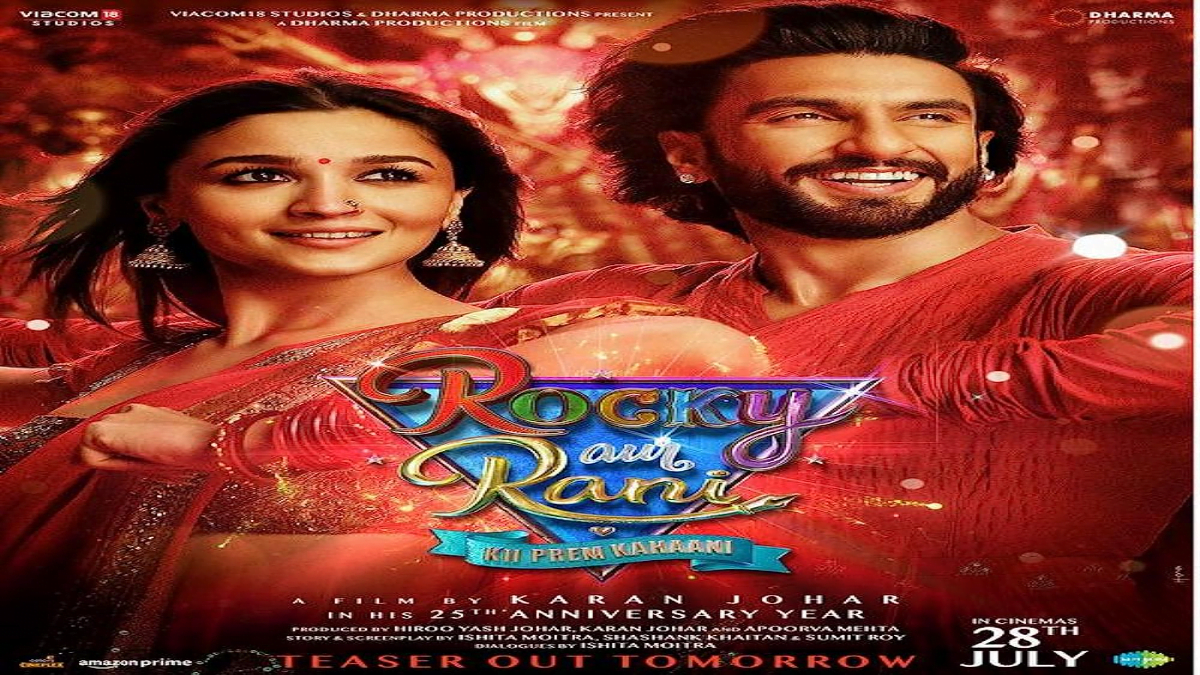‘Rocky Aur Rani Ki Prem Kahani’ and the rebellious power of love
Rocky aur Rani ki Prem Kahani rides high on visuals, entertaining over-dramatic scenes, and the star power of Ranveer Singh and Alia Bhatt among other surprise appearances. Underneath all this, the film does have a rebellious core at heart, as mentioned by Anupama Chopra in her review of the film. It does this part well enough to remind us of movies like Barfi!. The story follows lovers Rocky Randhawa and Rani Chatterjee as they decide to switch families for three months to see if they are a fit for each other’s families. The plot also follows them secretly plotting to bring together their grandparents who are estranged lovers. Undoubtedly, the film will make you both laugh and cry.
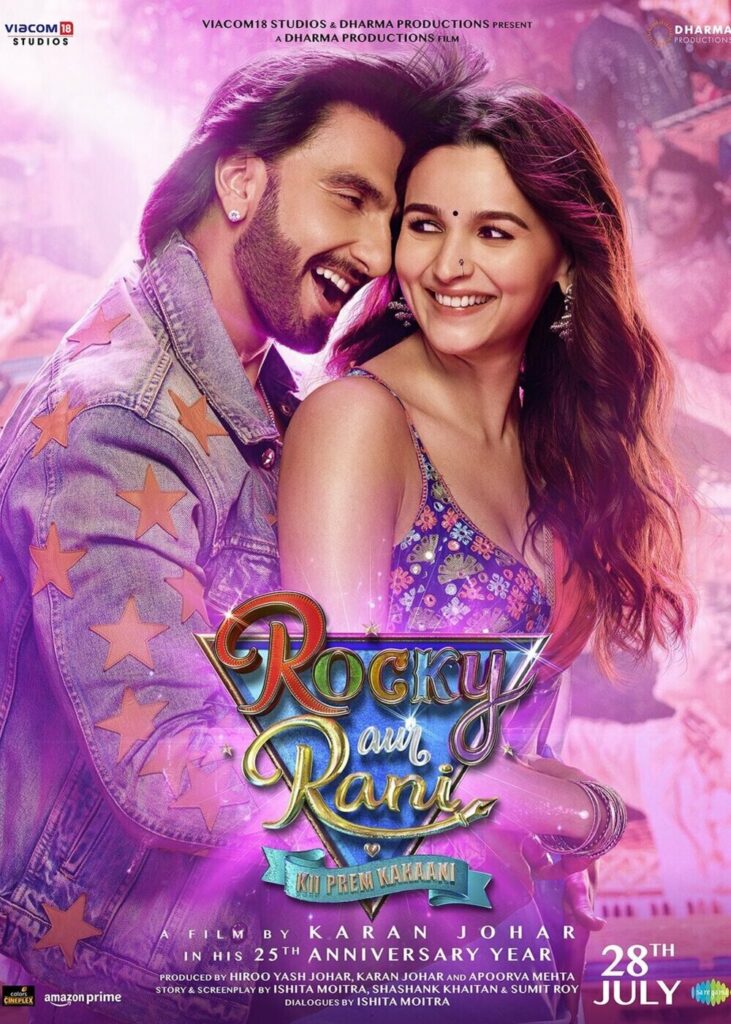
Tackling the question of love at two fronts, and whether it needs to be given up when it comes to family, the film handles the challenges of romantic relationships remarkably well. In relationships, often small fights seem to turn into huge debates and although they seem superficial at first, after a point, one thing leads to another and conflict is created. The film portrays these nuances perfectly and is totally entertaining during its journey, full of over the top dramatic moments in the middle of the most serious scenes which work remarkably well. Though the music is largely forgettable and meh (especially the remix of the Jhumka song), the shameless exploitation of classic old gems works really, really well.
While the romance is fun, the humour is a mixed bag
The first half of the movie is arguably the funniest Bollywood has been in ages. Although the humour strikes well (especially from the reaction of the audience to the movie in the theater), it often hinges on questionable lines. There are jokes regarding the substitution of ‘intercaste‘ in context of marriage with the word ‘intercourse‘, or ‘orgasm‘ for ‘organise‘ and even some jabs which are plain fatphobic. It depends upon the viewer to decide if this is appropriate comedy. At the same time, the movie does address that these funny instances which everyone laughs at or becomes embarrassed for, do have a background embedded in power relations in the family.
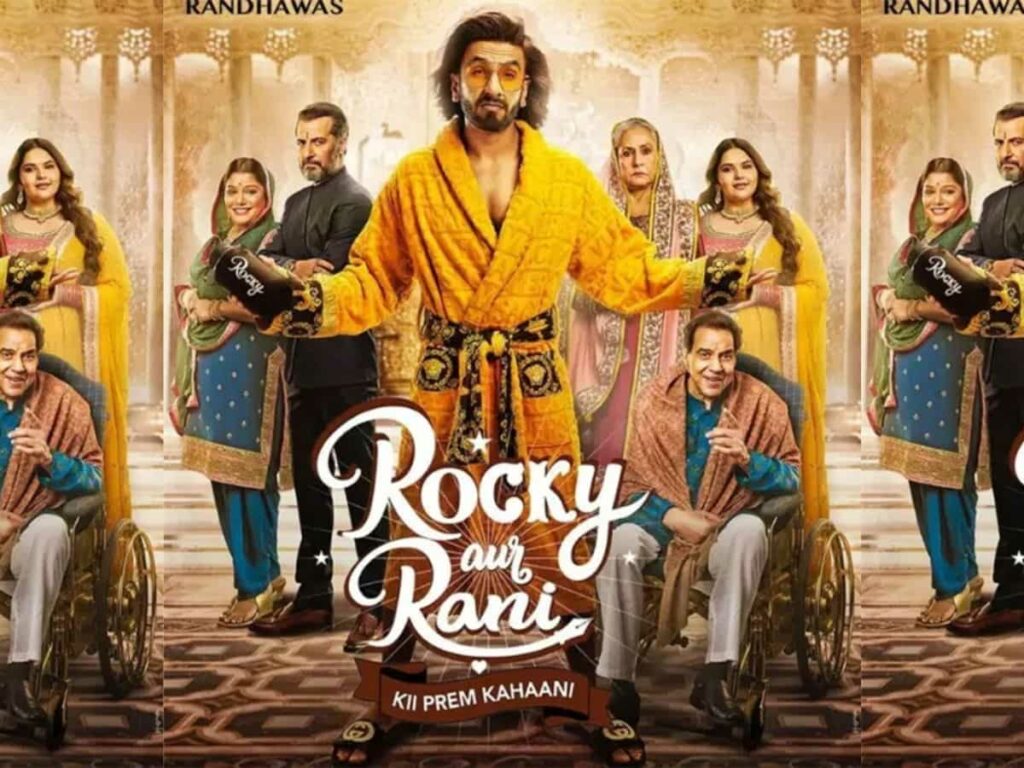
Another fact about the same humour is that it is targeted largely at class differences. English, as a language and culture, is usually the proud possession of the social elite. Initially, the movie indulges in all these jokes which are mostly centered around poor English but soon it begins to question the position of education and class status for two people who want to be together. It questions if love can ignore social differences and of course it being Bollywood, it does so in the most grand manner possible yet has its own quaint charm.
On one hand, some of the abrupt humour is directed at the black lives matters movement, which does not make sense at all. On the other hand, some of the humour involves Dhanlaxmi (played by a menacing Jaya Bachchan) literally asking Rani (played by Alia) ‘Sochti ho tum?’ (So you also think?) as a powerplay to undermine her efforts while Rani is trying to win over the family.
The movie tries to tie all these threads with a monologue on cancel culture which hits the right points especially with the context established in the movie but alas, it is poorly executed overall.
Other similar exchanges that explore the age-old saas-bahu rivalry are also fun even though Dhanlaxmi is not Rani’s saas (mother in law). Rani actually shares a sweet bond with her mother in law and her sister in law. There is another very fun bra shopping scene between Ranveer Singh and Churni Ganguly’s character which also takes a jibe at the way respect for women is dealt with in the society. The movie tries to tie all these threads with a monologue on cancel culture which hits the right points especially with the context established in the movie but alas, it is poorly executed overall.
The female characters and a cultural clash of masculinity vs femininity
Alia Bhatt plays a misguided feminist at best through Rani who calls out a politician about women’s safety stating a very poorly written argument, but then covers a dance form in Kashmir as a journalist while daydreaming about dancing with Rocky amidst the snow. In general, Karan Johar’s female characters do have some agency and Rani stands true to it. She also becomes the feminist messiah somewhere during the movie trying to emancipate the Randhawa women burdened under the patriarchy, questioning marriage, and also by questioning the need to respect elders if they are awful people. There is nothing more to these female characters as they largely remain a product of their cultures and class, which is where masculinity and femininity play at large.
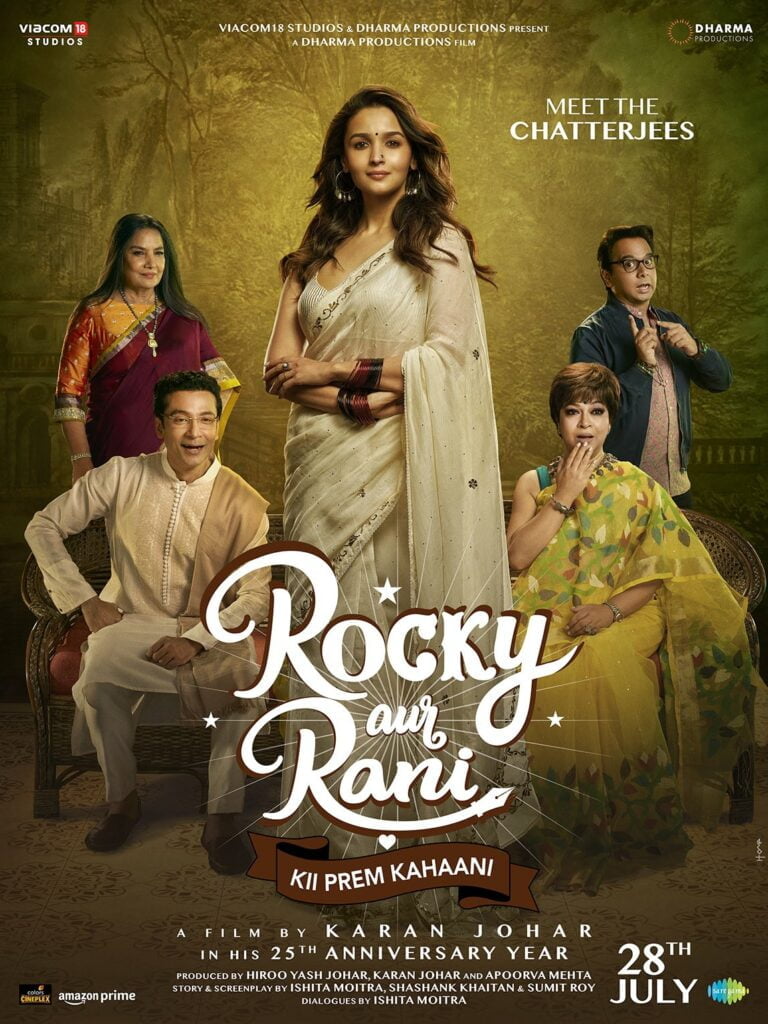
The family swap in the movie is based within the clashing cultures of Punjabis and Bengalis, the former presented as overwhelmingly masculine and crass and the latter overwhelmingly feminine and poised. The family swap is also posed as a way to decide if the family matches the bride’s and groom’s expectations which is also fun to watch as it plays out. But the way culture is portrayed is stereotypical.
The family swap is also posed as a way to decide if the family matches the bride’s and groom’s expectations which is also fun to watch as it plays out. But the way culture is portrayed is stereotypical.
While Rani’s family is liberal what with being politically aware, freely drinking alcohol together, lacking strict divisions of domestic labor, and everyone engaging in cultural exchanges like music and literature; Rocky’s family is a typical patriarchal household where his mother is a silent figure in the background (also an aspiring singer), his sister is an overweight girl who is finding it difficult to get a groom, and his father, the puppet patriarch, follows every word of his grandmother’s.
The most surprising scene in the movie (other than a kiss between two elderly people) involves Rocky dancing kathak with Rani’s father. Earlier in the movie, we see Dhanlaxmi setting up Rani’s father to dance kathak on a wedding stage where he becomes a laughing stock to the largely Punjabi crowd who sees him dancing in a very feminine (also derogatory) way.
During Durga Pooja, Rocky performs a Kathak dance with Rani’s father and the movie theater goes crazy watching them reclaim the stage. The way the audience was celebrating a masculine icon like Ranveer moving gracefully to Dola Re Dola was honestly good to see. The question is if the audience would have cheered in the same manner for a feminine male figure performing the same dance. Ranveer’s performance garnered praise mostly due to his stardom as a masculine hero while Rani’s father’s performance did not receive the same applause. As for the depiction of Bengali male characters, Rani’s male friend Soumen (presented as less attractive than Ranveer’s Rocky) who wants to marry her was a comic relief at best.
Ranveer also brings a lot of camp as part of his role to the aesthetics of Rocky, which also centers the humour around consent and objectification. Even Rani makes fun of it but by the end of the movie, someone waiting outside your office playing Aaja meri Gaadi mein Baith Ja is indeed exciting.
Ranveer also brings a lot of camp as part of his role to the aesthetics of Rocky, which also centers the humour around consent and objectification. Even Rani makes fun of it but by the end of the movie, someone waiting outside your office playing Aaja meri Gaadi mein Baith Ja is indeed exciting. I find it hard to see anyone other than Ranveer Singh in Bollywood being capable of doing this. While the queerbaiting factor and the politics of using Ranveer’s physical body for sex appeal problematises the film, I feel that it is a way of selling things which are entertaining at the end of the day to the masses.
Treating family as imperfect
Rocky’s family is where matriarchy prevails with Dhanlaxmi ruling with an iron fist and removing any scope for love in her family. She keeps honour, tradition, and gender roles at the forefront. There are three very important points raised in the movie. Firstly, if there is no love in a family, then what sustains it? Secondly, while the family can be a safe space, it is also a place where power, toxic masculinity, and violence prevail. Thirdly, it addresses the lonely nature of senior citizens in a family and tries to make a love story between two elderly people work out, which happens to be the core rebellion of the movie. Dhanlaxmi is a lonely woman and she is reminded of this in a heated argument where we actually feel bad for her. But it is also a moment where her own son accuses her of pushing him more towards toxic masculinity.
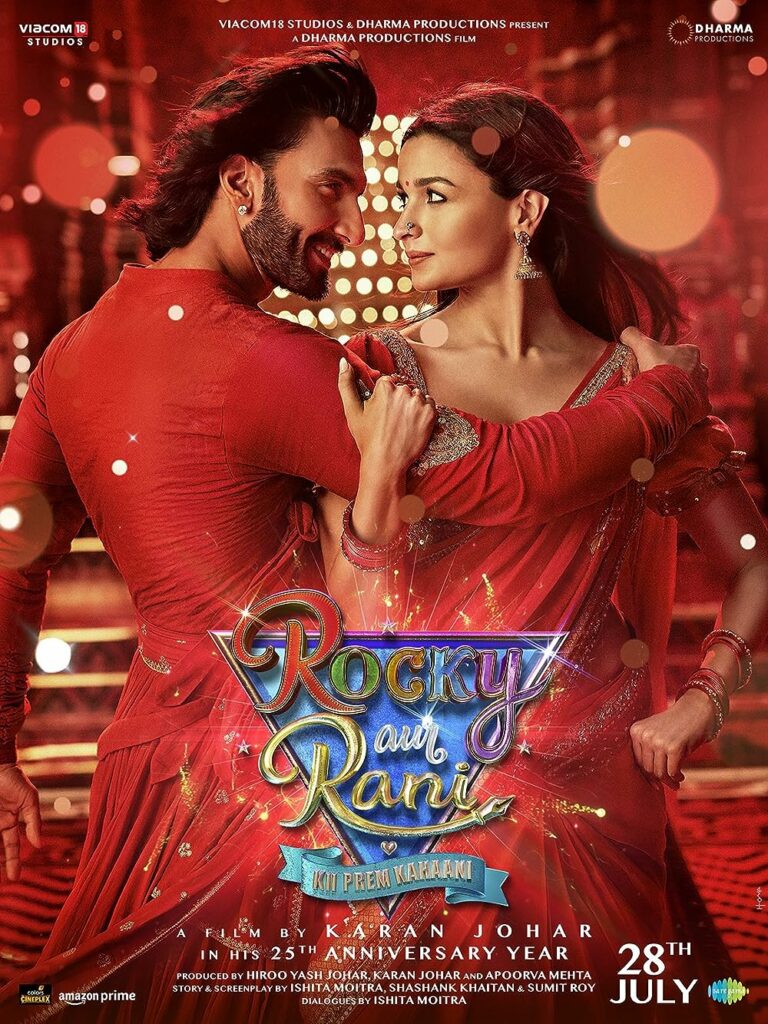
More than this, during a conversation between Rani with her family, we get to know that even Rani’s family is imperfect. It is revealed that her grandfather used to physically abuse her grandmother and his own son (Rani’s father) for his interest in dance. This traumatic past is rekindled when Rani accuses her grandmother of cheating on her late grandfather with Rocky’s grandfather Kaval in 1978. Her grandmother owns up to it stating that she was happy with seven days of star-crossed love rather than keeping fidelity in a violent marriage.
On the surface, it might seem like something which is apparent but we need to take into account that the film caters to the larger crowd where such conversations are often pushed under the rug and never see the light of the day. It then makes it actually exhilarating to see how a mainstream movie attempts these conversations so fearlessly.
‘Rocky Aur Rani Ki Prem Kahani‘: our final verdicts
Rocky Aur Rani Ki Prem Kahani has a certain charm in part due to its lead pair being Ranveer and Alia, a stellar fun-filled first half and its shameless yet successful use of classic Hindi songs. Even with a mostly forgettable original musical score, the charm surprisingly works and presents the family as imperfect in a discursive paradigm which deems the family to be perfect and above everything, contrary to Karan Johar’s past filmography. As expected, the ideas of feminism are half-cooked and while Ranveer manages to bring in camp briefly in a stereotypical representation of the Bengali and Punjabi cultures, this Bollywood entertainer about the rebellious nature of love is a very fun and certainly a refreshing addition to Karan Johar’s melodramatic slate of films.
